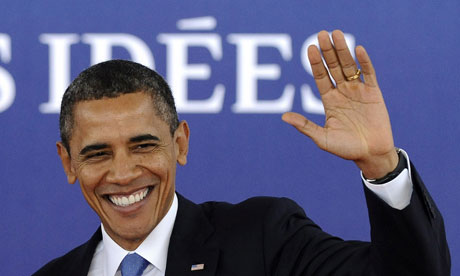M WAQAR..... "A man's ethical behavior should be based effectually on sympathy, education, and social ties; no religious basis is necessary.Man would indeed be in a poor way if he had to be restrained by fear of punishment and hope of reward after death." --Albert Einstein !!! NEWS,ARTICLES,EDITORIALS,MUSIC... Ze chi pe mayeen yum da agha pukhtunistan de.....(Liberal,Progressive,Secular World.)''Secularism is not against religion; it is the message of humanity.'' تل ده وی پثتونستآن
Thursday, May 17, 2012
Barack Obama and François Hollande: new style, same substance
When France's Socialist president, François Hollande,
arrives at the White House for breakfast with Barack Obama
on Friday, the US right might be tempted to dust down the old freedom fries metaphors.
After all, Hollande's main sticking point with Washington and Nato is his election promise to withdraw French troops from Afghanistan by the end of this year – one year earlier than Sarkozy's promised 2013 and two years earlier than Nato's agreed 2014 finish date. But it would be wrong to think that the social-democrat, consensus-style pragmatist Hollande marks a return of cheese eating surrender monkeys out to make trouble for Washington.
In terms of personality and style, Hollande and Obama would seem to have a lot more in common than Obama and the rightwing Nicolas Sarkozy. Both come from broadly centre-left ground. Both have taught at universities. Hollande speaks English, whereas Sarkozy struggled. The more impulsive Sarkozy marked a change in Paris's policy towards Washington. He was an unabashed Atlanticist who was close to George Bush, ate burgers at the Bush family ranch, declared his admiration for Tom Cruise, Arnold Schwarzenegger and Elvis, went jogging in a New York Police Department T-shirt and called the US a "moral and spiritual" model. Sarkozy and Obama, despite their clear public unity and good working relationship, were never as pally behind the scenes as Sarkozy would have liked. The classified US memos released by WikiLeaks depicted Sarkozy as sometimes erratic, undiplomatic and hyperactive, despite being the most pro-US French president since the second world war.
Sarkozy put an end to the 2003 Paris-Washington spat over the Iraq war and, to America's delight, brought France back into Nato's integrated command amid criticism from Hollande's Socialist party that he was making France a poodle to the US. But Hollande will not reverse those moves, even if he wants extra assurances on issues such as European defence. Paris-Washington relations are likely to stay close and change very little, with France remaining a firm, if independent, ally. Hollande recently said he would "assert France's independence without making things difficult for Barack Obama".
Although he won't row back on his popular promise of an early French exit from Afghanistan – he has declared "Our mission in Afghanistan is complete" – there could be a compromise on the wording, substance and staggered timings of a withdrawal, not as a capitulation to pressure from the US and other unhappy Nato partners but to deal with the tricky logistics of a fast exit.
Afghanistan will be a key topic at the G8 and in Chicago, but so will the euro crisis. On several economic points, Obama and Hollande are close, particularly on Hollande's call for growth measures to temper the one-size-fits-all austerity drive. Hillary Clinton has openly praised the quest for more growth measures in Europe.
Hollande's resolve to put in place higher tax rates for bigger earners, put pressure on fat cats and give public support to small businesses are all shared by Obama. At the G8 summit at Camp David, Hollande will seek to reassure world leaders that wanting more growth does not mean copping out on cutting public debt. Pierre Moscovici, the new French finance minister, said on taking office that "public debt is an enemy" and the government must reduce the deficit.
Dominique Moïsia senior adviser at the French Institute for International Relations said the Hollande-Obama style was likely to be defined by "gravity and serenity". He added: "I don't see things changing that much really. There will be a different style. In some ways in their values Obama and Hollande are closer than Obama and Sarkozy were." He said Afghanistan could make things slightly harder for Obama on the eve of an election but there was a kind of resignation in Washington that France had made up its mind although there could be some accommodation on the technicalities.
Subscribe to:
Post Comments (Atom)


No comments:
Post a Comment